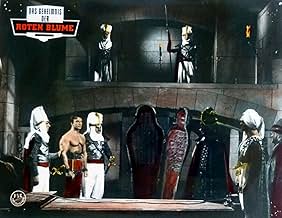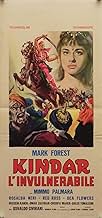Although Steve Reeves is the first name which comes to mind when one thinks of "Peplum" movies – and with good reason since he was the subgenre's first (and perhaps only) bona-fide star – the sheer fact that I was introduced to them as a kid in the early 1980s via Italian TV broadcasts of MOLE MEN AGAINST THE SON OF HERCULES (1961) and GOLIATH AND THE SINS OF BABYLON (1963) has made me look out for Mark Forest's movies more than any of the others who have likewise stepped in the sandals of such muscle-bound heroes over the years. Indeed, out of 14 titles in Forest's filmography, I have now watched all but one – THE MAGNIFICENT GLADIATOR (1964). The film under review, then, made when the mythological epics had been overtaken in popularity by the newest fad in Italian cinema i.e. Spaghetti Westerns, was his last film appearance since, unlike his contemporaries, he apparently chose not to diversify his curriculum – even though he was a professional singer and a qualified teacher of that art form!
Rather than bow out playing in any one of the roles that had made his name like Hercules and Maciste, Forest's final star vehicle was an "Arabian Nights"-type fable with his superpowers – emphatically stated in the film's very title – here being attributed not to any blood relation to the gods but having his mother being hit by a lightning bolt during the fatal childbirth. This conveniently satisfies a prophecy that this kingdom's first-born can only ever be harmed by "a red flower". Needless to say, a band of rogue desert nomads come to hear of this through the duplicitous court maid and they kidnap the child and murder the latter witness. Curiously enough, the villain (Mimmo Palmara) dispatches his newly-acquired son to be raised by an old woman in a remote part of the sand dunes and only returns to claim him 30 years later!; by that time, he has not only grown into Mark Forest but his favourite past time seems to be swimming in crocodile-infested waters while racing and daring them to catch up with him (even if he is still unaware of his extraordinary powers)! Once he is back into the fold of Palmara's tent encampment, he is belatedly and summary trained in the art of war and sold to the troops – by ordering his astonished archers to cut down his own son with arrows – as their secret weapon against the armies of Forest's real sovereign father – led by his younger brother Howard Ross (here still billed under the more colourful moniker of "Red Ross").
True to formula, given that there are two brothers and two battling factions in the narrative, there must also be two women, one who divides the siblings and one who comes between putative father and adopted son; the former is played by the unlikely-named Dea Flowers (in what appears to be her only role) and the sultry Rosalba Neri fills the latter. Flowers is bethrothed to Ross but soon falls for Forest's tender loving care when kidnapped by Palmara's clan and supposedly given to him as a slave; similarly, Neri is the rebel leader's favourite but soon falls under the spell of Forest's brawny figure. During the course of the film, the two brothers are unknowingly engaged in a duel to the death but the kind-hearted Forest is somehow unwilling to go through with it and spares Ross' life; later still, while ostensibly employed to insinuate himself into the enemy fortress, Forest gets to learn the truth after meeting his father and brother face to face. Needless to say, our hero turns against Palmara and executes him – but not before Neri sacrifices her life for him to "the red flower" (which turns out to be plain fire after all) – and new Prince Regent Ross relinquishes his bride-to-be Flowers to a modest family life in the desert oasis Forest inhabited as a kid.
All in all, while not a particularly outstanding entry in the genre, this proved a surprisingly decent and enjoyable one which I came across dubbed in English on "You Tube" – especially in view of the fact that it was Forest's swan-song, was directed by Civirani – who had made the latter's weakest effort, HERCULES AGAINST THE SONS OF THE SUN (1964) – and, what is more, was originally titled very similarly to Antonio Margheriti's ANTHAR L'INVINCIBLE aka THE DEVIL OF THE DESERT AGAINST THE SON OF HERCULES (1964) starring Kirk Morris that I just caught up with a few days ago, which ought to have spelled redundancy!




















